Introduction
As organizations increasingly turn to artificial intelligence to drive innovation and enhance operational efficiency, the role of AI consulting has never been more critical. This comprehensive advisory service encompasses everything from assessing business needs to implementing tailored AI solutions that seamlessly integrate into existing frameworks.
With the potential to transform decision-making processes and significantly reduce costs, AI consulting not only empowers businesses to navigate the complexities of AI adoption but also addresses pressing concerns such as data privacy and ethical implementation.
As the landscape continues to evolve, understanding the benefits, challenges, and future trends of AI consulting becomes essential for organizations aiming to harness the full potential of this transformative technology.
Defining AI Consulting: An Overview
The AI consulting business encompasses a broad spectrum of advisory services designed to assist organizations in the effective implementation of artificial intelligence technologies. This process begins with a thorough assessment of organizational needs, followed by the identification of appropriate AI solutions and guidance on the seamless integration of these systems into existing operational frameworks. AI consultants utilize their extensive technical expertise to analyze data, optimize algorithms, and create tailored strategies that align with the specific goals of each organization.
The primary aim of the AI consulting business is to leverage the transformative capabilities of artificial intelligence to enhance decision-making processes, boost operational efficiency, and foster innovation. As companies increasingly acknowledge the value of AI, the emphasis on achieving measurable outcomes, such as a 35% reduction in infrastructure costs, becomes crucial in driving business success. However, challenges such as privacy and data risks persist; as noted by an expert, 'Globally, privacy and data risks, like leaks, are top concerns.'
These risks were flagged by:
- 42% of North American organizations
- 56% of European ones
Additionally, a case study named 'AI Development Solutions' illustrates the effective execution of an AI consulting business, where the firm delivered complete AI development that aids various departments, including AI assistants and data analysis.
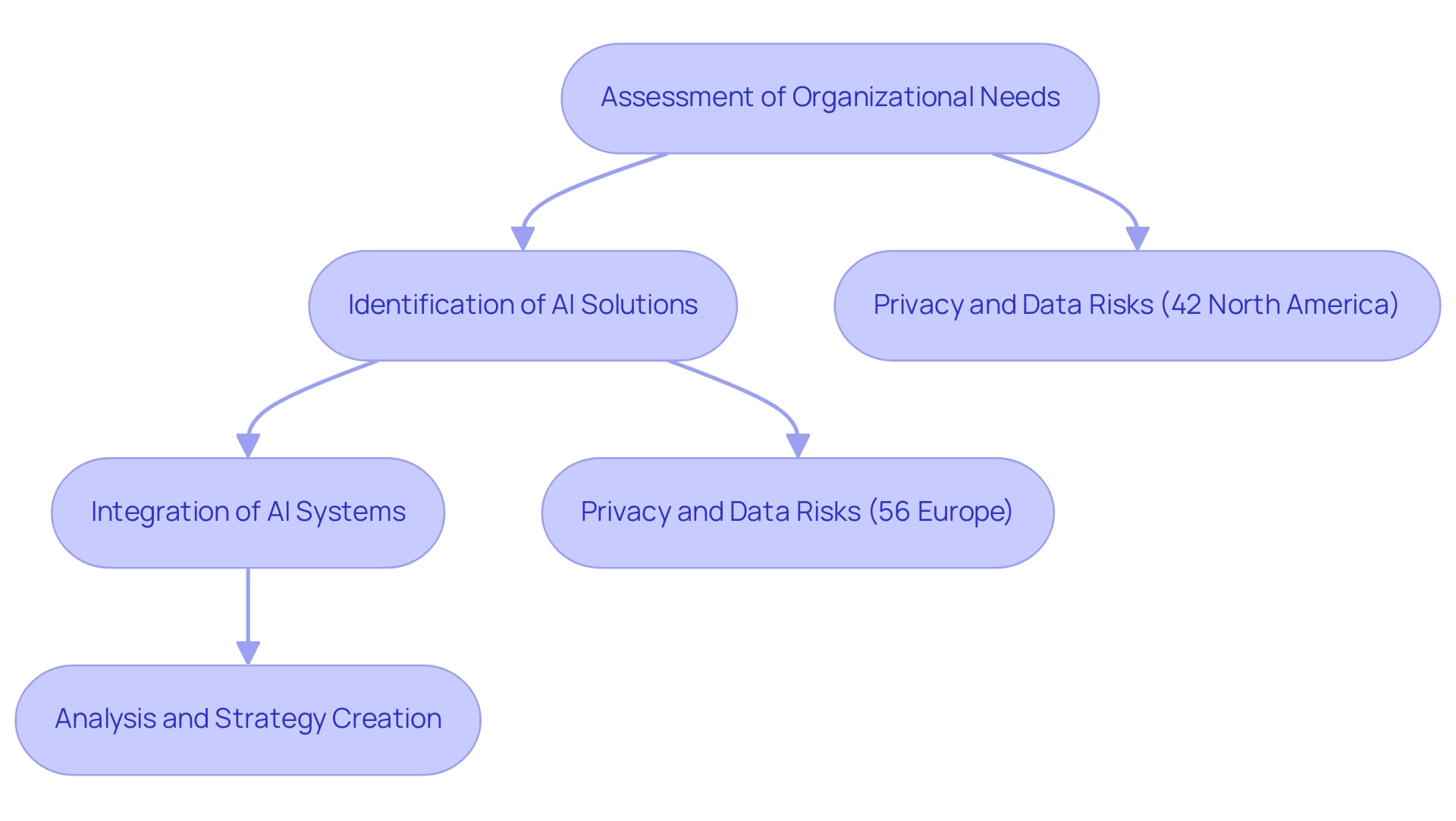
The Benefits of AI Consulting for Businesses
The ai consulting business offers a plethora of advantages for organizations, notably in enhancing operational efficiency and improving customer experiences. With approximately 85% of the public advocating for a nationwide effort to ensure AI safety and security, the significance of responsible AI integration cannot be overstated. In October 2023, the White House issued an Executive Order establishing new standards for AI safety and security, requiring large AI developers to share safety test results and develop cybersecurity programs.
This regulatory environment emphasizes the necessity for companies to adopt AI approaches responsibly. By employing AI solutions, companies can automate routine tasks, allowing teams to redirect their focus toward more strategic initiatives. For instance, companies like Spotify leverage AI to detect fraudulent streaming activity and personalize music recommendations, thereby enriching user engagement.
Furthermore, an AI consulting business empowers organizations to analyze vast datasets, extracting valuable insights that inform marketing strategies and product development. According to Forrester,
AI-driven personalization and customer service improvements can increase customer retention rates by 10-15%.
However, entities must also acknowledge the risks associated with generative AI use, including data management risks such as privacy, bias, and intellectual property infringement.
Ultimately, the adoption of AI technologies not only facilitates significant cost savings but also establishes a competitive edge in an increasingly data-driven marketplace.
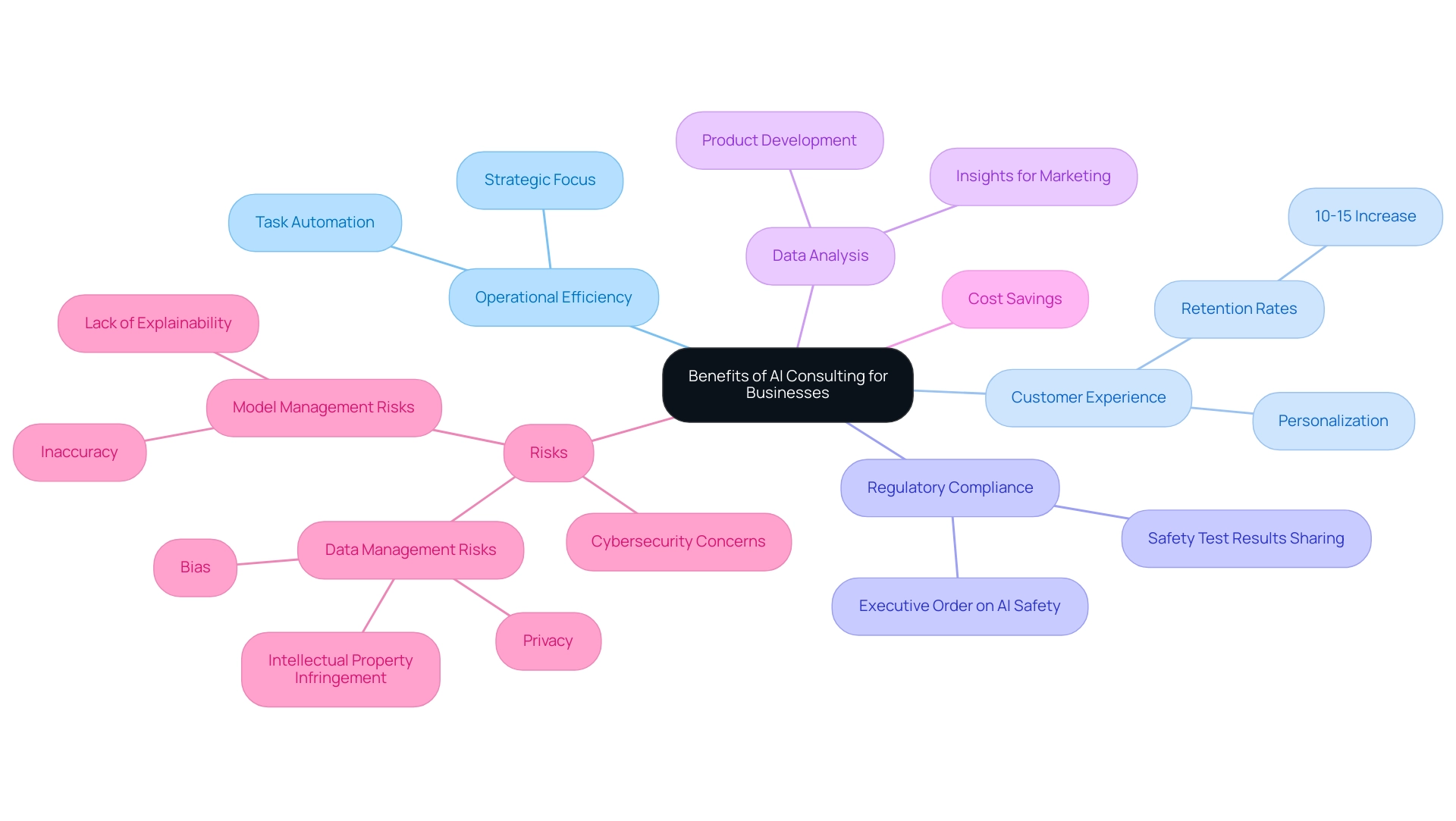
Key Components of AI Consulting Services
The AI consulting business offers multifaceted advisory services, encompassing essential components such as needs assessment, solution design, implementation, and ongoing support. The consulting process begins with a meticulous analysis of the entity’s existing processes and data, identifying key areas where AI can deliver substantial value. This needs evaluation is essential; according to recent surveys, around 55% of Americans interact with AI daily, and 72% of executives consider AI as the most important advantage for the future.
Moreover, 85% of the general public believe a nationwide effort is necessary to make AI safe and secure, reflecting the industry's focus on safety and security standards. After the evaluation, the AI consulting business develops customized AI strategies that align with the entity's specific goals. As companies increasingly integrate AI into their operations—44% of entities are already doing so—effectively implementing these tailored solutions is crucial for the AI consulting business.
This phase involves integrating AI technologies into current systems to ensure seamless functionality. Additionally, the rapid growth of AI and machine learning specialists, the fastest-growing job category, highlights the evolving landscape of expertise in this field. Ultimately, continuous assistance and education are essential in aiding entities to optimize their investments in the AI consulting business and adjust to the swiftly changing technological environment.
As indicated by IDC, by the end of 2024, one-third of G2000 firms are anticipated to utilize innovative models to improve their monetization potential with generative AI, highlighting the significance of strategic advisory in navigating this transformative shift.
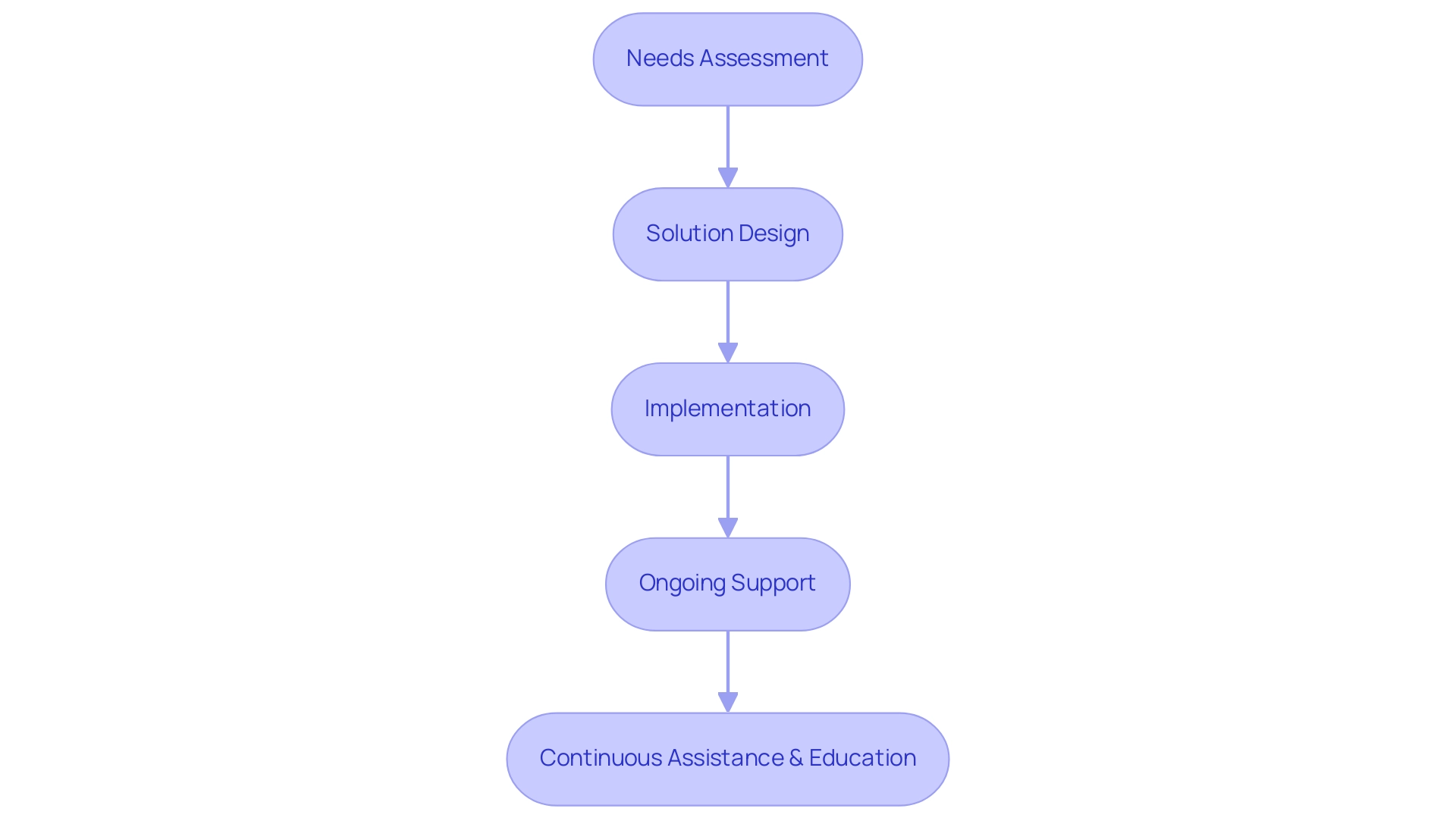
Challenges in AI Consulting Implementation
Implementing an AI consulting business presents multifaceted challenges that organizations must navigate to reap the benefits of this transformative technology. A significant hurdle is employee resistance to change, which remains prevalent as 83% of businesses recognize the need to weave AI into their strategies. According to a recent analysis by Lumoa, the main challenges encountered in implementing AI for customer experience in 2024 include not only this resistance but also the technical complexities of integrating AI solutions with legacy systems.
The industry distribution of participants shows that:
- 9% are from physical products
- 24.2% from advisory services
- 29.5% from SAAS/software
- 37.3% from other sectors
This highlights the diverse challenges faced across various industries. Such integration often necessitates substantial investments in training and infrastructure. Furthermore, organizations must address data privacy and security concerns, which require meticulous planning and adherence to regulatory standards.
To overcome these barriers, a proactive approach to change management in the AI consulting business demands engaging all stakeholders and ensuring they are well-informed and supported throughout the transition. For instance, AI Development Strategies demonstrates how a comprehensive approach to AI implementation can yield successful outcomes across various departments by creating customized tools such as AI assistants and data analysis applications. This highlights the importance of strategic planning and effective communication in overcoming resistance and achieving a smooth adoption of AI technologies.
Notably, an AI-based behavior analysis and sales forecast solution has resulted in:
- A 15% increase in visitors-to-buyers conversion rate
- A 35% boost in data collection volume
- A 35% reduction in infrastructure costs
This underscores the potential benefits of overcoming these challenges.
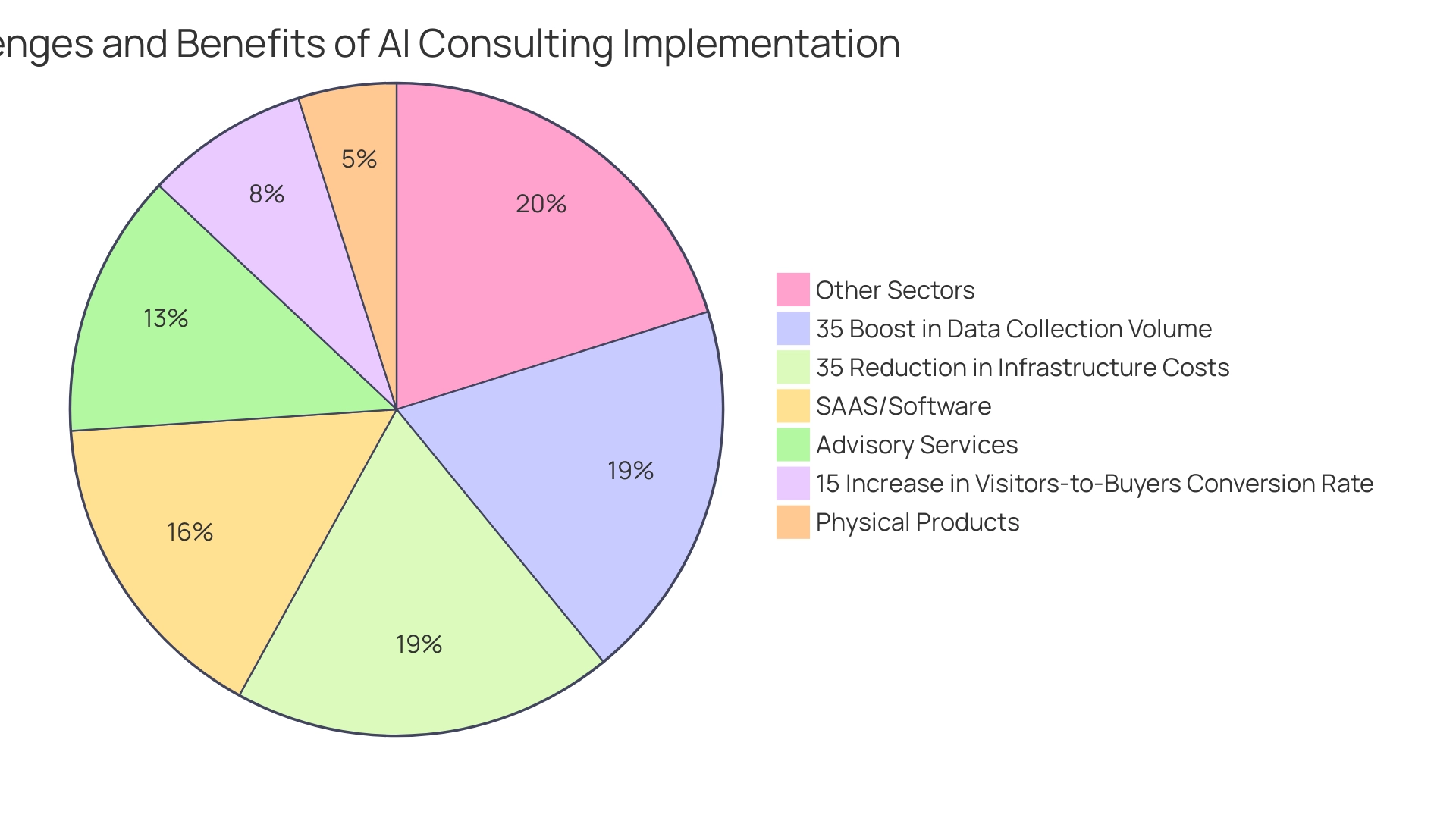
Future Trends in AI Consulting
The ongoing advancements in artificial intelligence technology are poised to considerably reshape the AI consulting business landscape. The market is projected to experience a remarkable growth of 35.40% in 2024, reflecting the increasing reliance on sophisticated machine learning and deep learning algorithms that significantly enhance AI capabilities. As economies continue to evolve and embrace AI, the market is expected to witness significant growth in the coming years, as noted by Statista Market Insights.
As organizations strive to integrate AI consulting business into their core operational strategies, there will be a pronounced emphasis on ethical AI practices, ensuring that AI systems are not only effective but also fair, transparent, and accountable. This ethical focus is crucial as approximately half of the respondents in recent studies recognize cybersecurity risks, particularly concerning inaccuracies and intellectual property infringement in generative AI applications. Furthermore, the emergence of low-code and no-code platforms is set to democratize AI implementation, enabling non-technical users to utilize AI tools effectively.
This trend will foster innovation and sustainable growth in the AI consulting business, as businesses leverage AI solutions holistically to drive competitive advantage in an evolving marketplace. The delineation of in-scope AI applications, such as:
- Natural language processing tools (e.g., chatbots)
- Computer vision applications (e.g., object detection)
further clarifies investment focus areas, ensuring that resources are allocated efficiently within this rapidly expanding domain.
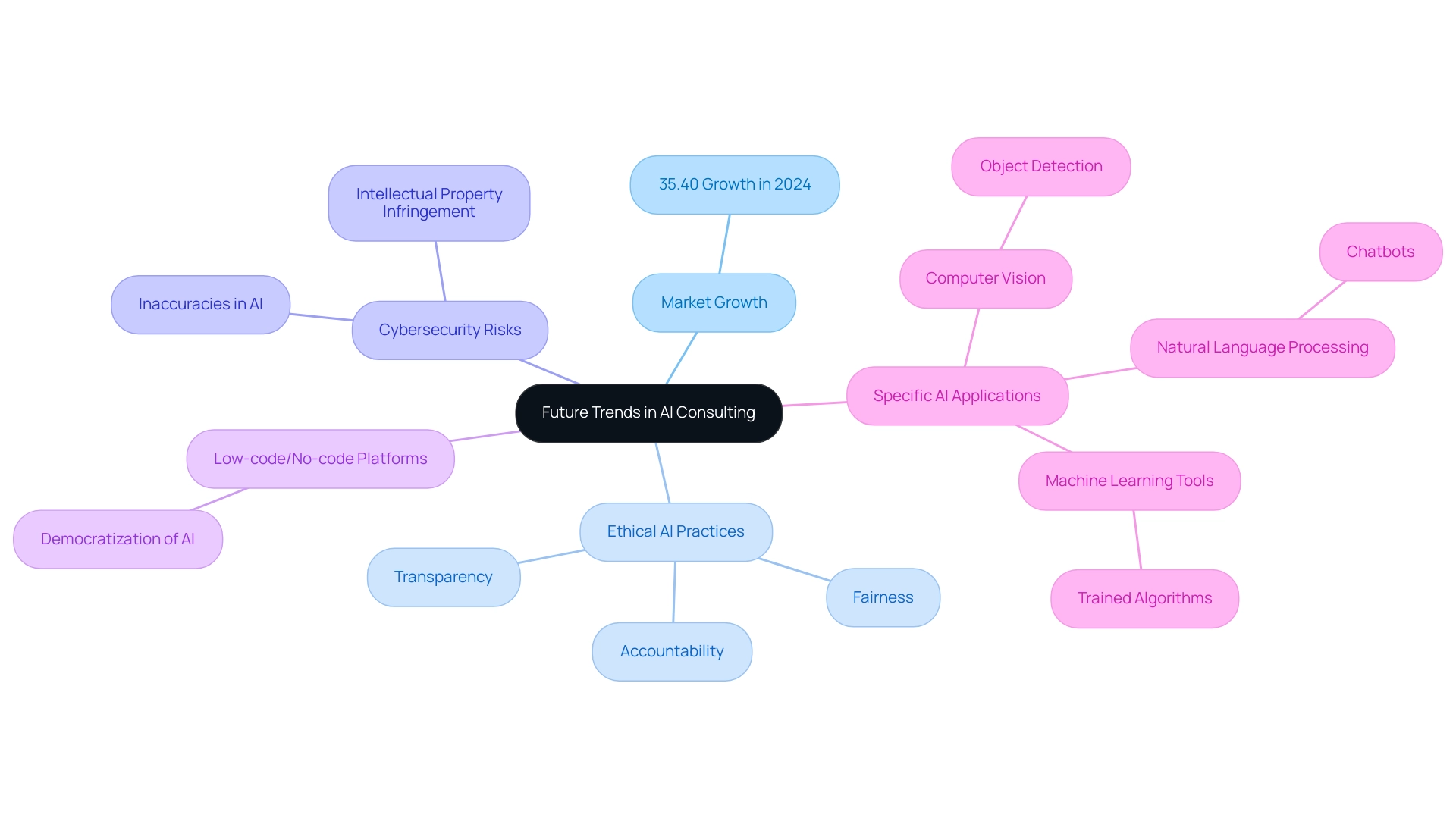
Conclusion
AI consulting stands at the forefront of business transformation, offering essential services that empower organizations to effectively implement artificial intelligence technologies. By conducting thorough needs assessments and crafting tailored solutions, AI consultants help businesses harness the full potential of AI to enhance decision-making, boost operational efficiency, and drive innovation. The significant benefits, including improved customer experiences and substantial cost savings, underscore the critical role that AI consulting plays in navigating the complexities of AI adoption.
However, the journey is not without its challenges. Organizations must confront:
- Employee resistance
- Technical integration issues
- Data privacy concerns
A proactive approach to change management and strategic planning is vital in overcoming these hurdles, ensuring that all stakeholders are engaged and supported throughout the transition. Successful implementations, as evidenced by case studies, demonstrate that these challenges can be surmounted, leading to improved performance metrics and competitive advantages.
Looking ahead, the future of AI consulting is poised for remarkable growth, driven by ongoing technological advancements and a growing emphasis on ethical AI practices. As organizations increasingly prioritize responsible and effective AI integration, the emergence of low-code and no-code platforms will further democratize access to AI tools, fostering innovation across diverse sectors. Embracing these trends will be essential for businesses aiming to thrive in an increasingly data-driven marketplace, reinforcing the importance of AI consulting as a strategic partner in this transformative journey.




